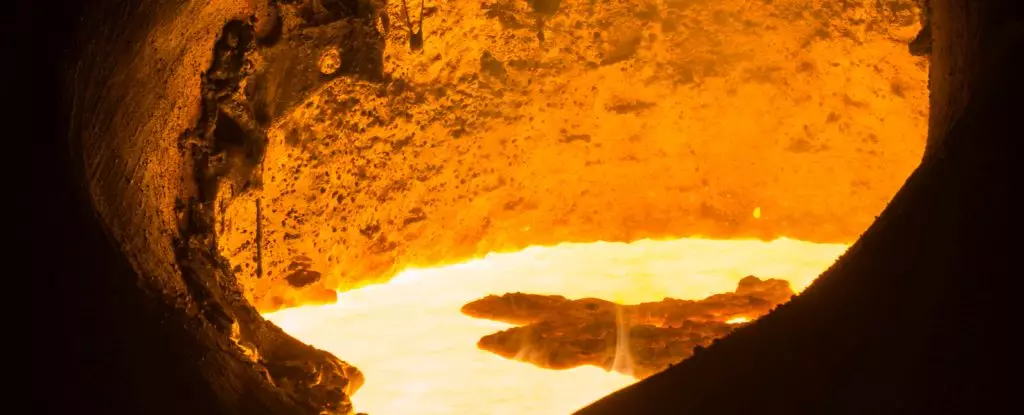Recent groundbreaking research has uncovered a staggering truth about our planet: beneath the surface we tread, Earth’s core is a treasure trove, rich with gold and other precious metals. The idea that our planet’s core harbors such wealth is not just a fantastical notion; scientific exploration has confirmed that a significant portion of these metals is seeping through the mantle and into the crust, revealing secrets of Earth’s formative years. The implication is as breathtaking as it is sobering—we live on a planet that is essentially hoarding enough gold to envelop its landmass in a thick shroud of opulence.
The work conducted by Nils Messling and his team from Göttingen University sheds light on this issue. They discovered that while gold can indeed be found in Earth’s crust, its presence is a mere shadow of what lies beneath. The team utilized a novel approach to analyze isotopes—specifically, those of ruthenium—as a means to trace back the origins of these heavy metals. Their findings could reshape how we understand not only the geological history of Earth but also the elemental dynamics that govern other rocky planets in our solar system.
From Core to Crust: The Journey of Precious Metals
To appreciate this discovery fully, one must consider how these elements migrated from the core to the crust. This process involved primitive geophysical behavior; as the planet formed, dense metals sank to the core during the so-called “iron catastrophe.” Subsequently, extraterrestrial meteor bombardments added more gold and other precious materials to the surface.
Isolating the source of gold, platinum, or palladium we find today poses a challenge for researchers, with a perplexing question looming: how much of what we extract is truly native to our planet, and how much was delivered from space? Messling’s work posits that isotopic signatures can provide the answers. By focusing on the subtle differences between surface and core isotopes of ruthenium, they painted a clearer picture of how these coveted metals make their way up.
However, the real revelation resides in the notion that these elements are not merely static treasures trapped beneath layers of rock; they are actively leaking out, albeit at a slow pace. The idea of a nearly inexhaustible well of wealth should prompt deeper reflections on how we, as a society, regard natural resources. It raises questions about consumption, extraction methods, and the long-term sustainability of our habits as we exploit the planet’s riches.
A Cautionary Tale of Excess and Greed
While the potential for wealth extraction is tantalizing, it would be reckless to ignore the moral implications of this scenario. The discovery prompts a necessary dialogue about environmental stewardship and the often reckless race for natural resources. In an era marked by political divisions and economic disparities, the glistening allure of gold could easily lead us down a destructive path—one that prioritizes short-term gain over thoughtful conservation.
The idea of digging deep into the Earth to access these metals should horrify us in light of our current environmental crisis. The lessons we should extract from Messling’s findings are not limited to the economic implications but extend to ethical considerations as well. As humanity continues to grapple with climate change and resource depletion, we must forge new relationships with the Earth that prioritize sustainability and respect for our shared home.
Reimagining Our Relationship with Earth’s Wealth
Recognizing that Earth’s core is teeming with precious metals should not merely fuel ambitions of wealth accumulation; instead, it can inspire a shift in perspective. As we unravel the mysteries of our planet’s geology, we ought to engage in a broader contemplation of how we interact with the environment. If Earth’s core is leaking metals like gold and ruthenium, what other overlooked elements are seeping through the cracks of our understanding?
In a world increasingly defined by climate activism and a push for equitable resource distribution, the thirst for wealth buried in the depths of our planet could serve as both a blessing and a curse. The challenge lies in balancing our desire for exploration and innovation with the imperative of protecting our fragile ecosystem. The riches beneath us should be viewed not merely as a means to an end but as an integral part of our planet’s complex narrative—a narrative that has yet to unfold fully.


Leave a Reply